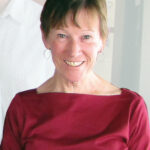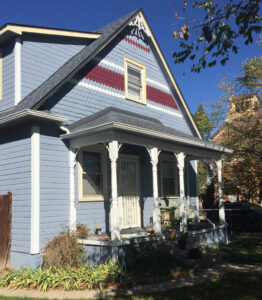By Mary Lou Egan
Margarete Gugger and Emma Reisbick. Everyone knew them. They lived in the neighborhood and were recommended by women you knew.

They were more prominent than politicians and more reliable. They were two of Globeville’s midwives. In turn-of-the-century Globeville, most babies were born at home with one of these two women in attendance: Gugger served Catholic women, and Reisbick tended to German-Russian ladies.
In addition to delivering the baby, these women provided care for two weeks following the birth, coming each day to check on the mother and infant.
Midwives did some light housekeeping, washed the diapers, looked after the other children when necessary, and encouraged and advised the mother. It also was the responsibility of the midwife to report the birth to the department of health, so a birth certificate could be issued.
Neighbors would bring chicken soup, angel food cake or fruit soup, meals considered nourishing and appropriate for the confinement. Gugger and Reisbick were both widows, and their profession became their livelihood. To practice midwifery, a woman had to pass an examination and acquire a license from the Colorado State Board of Medical Examiners.

Gugger obtained her license in 1913, and Reisbick in 1919. In the 1940s most births occurred at home, but by 1955, 99% were in the hospital. Soon there was a long struggle between doctors and midwives over professional turf and medical liability.
By 1976, the Colorado Legislature had legally eliminated midwifery in the state, but the practice of assisting women with homebirth didn’t disappear in Colorado, it just moved underground. Pressure from women, communities and the Colorado Midwifery Association led to the reintroduction and legalization of midwives in Colorado in 1993.
Degrees in midwifery were again offered at universities, along with practical, supervised experience. The “expert confinement care in your own home,” as stated in Gugger’s ad in the Aurora Democrat in 1933, that had been available to mothers in Globeville was now accessible to all Colorado’s women.
Mary Lou Egan is a fourth-generation Coloradan who loves history. You can reach her at maryloudesign@ comcast. net.

Mary Lou,
Great column. I was especially intrigued because I just reviewed a 2023 book written by a historian from Montana State University. It is called Birthing the West and looks at midwives in Montana, Wyoming and N and S Dakota. Much of the book covers the period of Reisbeck and Gugger greatest activity in Globeville. It also looks at how doctors moved to get rid of midwives to enhance their own prestige and financial bottom line. Immigrant communities were the last hold-outs.
Anyway, well done.
Rebecca
Hi Rebecca,
My name is William (Bill) Wieser, I was born in Globeville in Ms Guggers house on Washington St in Sept 1942. My dad was at War and not present I was too young to remember any details. My life in Globeville was a wonderful experience, playing all the sports Holy Rosery Elementary school offered, we practiced football at Argo Park, and was coached by local fathers and sponsored by local business for our uniforms etc. Most of the graduates from Holy Rosery went to Cathederal High and at all of our graduation class get to getters the group of Globeville eits always hang together and still that about Globeville, none of us still live in Globeville any longer. Most of my relatives have passed and I don’t know anybody that lives there any longer. Sad, loved you article brought back several memories that I am grateful for, with a joyful tear in my eye thank you. Bill